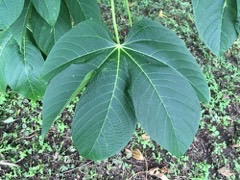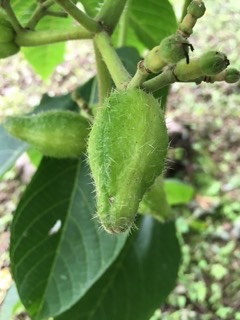 |
|
(c) Sergio Escutia Zúñiga, some rights reserved (CC BY-NC) |
 |
| (c) Sergio Escutia Zúñiga, some rights reserved (CC BY-NC) |
Translate this page:
Summary
Can be misspelt as Cnidoscolus eslasticus.
Physical Characteristics

 Cnidoscolus elasticus is an evergreen Shrub growing to 1 m (3ft 3in) by 1 m (3ft 3in) at a fast rate.
Cnidoscolus elasticus is an evergreen Shrub growing to 1 m (3ft 3in) by 1 m (3ft 3in) at a fast rate.
See above for USDA hardiness. It is hardy to UK zone 10.
Suitable for: light (sandy), medium (loamy) and heavy (clay) soils and prefers well-drained soil. Suitable pH: mildly acid, neutral and basic (mildly alkaline) soils. It cannot grow in the shade. It prefers dry or moist soil.
UK Hardiness Map
US Hardiness Map
Synonyms
Cnidoscolus eslasticus (misspelt). No synonyms are recorded for this name.
Plant Habitats
Edible Uses
References More on Edible Uses
Medicinal Uses
Plants For A Future can not take any responsibility for any adverse effects from the use of plants. Always seek advice from a professional before using a plant medicinally.
None Known
References More on Medicinal Uses
The Bookshop: Edible Plant Books
Our Latest books on Perennial Plants For Food Forests and Permaculture Gardens in paperback or digital formats.

Edible Tropical Plants
Food Forest Plants for Hotter Conditions: 250+ Plants For Tropical Food Forests & Permaculture Gardens.
More

Edible Temperate Plants
Plants for Your Food Forest: 500 Plants for Temperate Food Forests & Permaculture Gardens.
More

More Books
PFAF have eight books available in paperback and digital formats. Browse the shop for more information.
Shop Now
Other Uses
Carbon Farming Solutions - Industrial Crop: hydrocarbon (Crops grown for non-food uses. Industrial crops provide resources in three main categories: materials, chemicals, and energy. Traditional materials include lumber and thatch, paper and cardboard, and textiles) [1-1]. Hydrocarbon latex crops - Cnidoscolus elasticus, the source of highland Chilte, is an excellent rubber yielding tree from the states of Durango and Sinaloa, Mexico
Special Uses
Carbon Farming
References More on Other Uses
Cultivation details
Experimental Crop Industrial Crop: Hydrocarbon Management: Coppice
Climate: tropical highlands. Humidity: arid to semi-arid. Very little information is avaialble. One of the areas it grows well is Durango and Sinaloa, Mexico. Durango is one of the coldest regions in Mexico with an average daily high temperature of only 28 degrees centigrade. Several months of the year it is warm to hot at temperatures continuously above 25 degrees centigrade, sometimes up to 34 degrees. Carbon Farming Solutions - Cultivation: experimental. Management: coppice (Describes the non-destructive management systems that are used in cultivation) [1-1]. .
Carbon Farming
-
Experimental Crop
Plant breeders are testing these plants to see if they could be domesticated for cultivation, but they are still in an experimental phase. Examples include milkweed and leafy spurge.
-
Industrial Crop: Hydrocarbon
Materials, chemicals and energy include bioplastics, rubber, biomass products gasoline, jet fuel, diesel, butane, propane, biogas. Plants are usually resprouting plants and saps.
-
Management: Coppice
Cut to the ground repeatedly - resprouting vigorously. Non-destructive management systems maintaining the soil organic carbon.
References Carbon Farming Information and Carbon Sequestration Information
Temperature Converter
Type a value in the Celsius field to convert the value to Fahrenheit:
Fahrenheit:
The PFAF Bookshop
Plants For A Future have a number of books available in paperback and digital form. Book titles include Edible Plants, Edible Perennials, Edible Trees,Edible Shrubs, Woodland Gardening, and Temperate Food Forest Plants. Our new book is Food Forest Plants For Hotter Conditions (Tropical and Sub-Tropical).
Shop Now
Plant Propagation
Seed, Cuttings.
Other Names
If available other names are mentioned here
Highland chilte
Native Range
NORTHERN AMERICA: Mexico (Durango, Sinaloa)
Weed Potential
Right plant wrong place. We are currently updating this section.
Please note that a plant may be invasive in one area but may not in your area so it's worth checking.
None Known
Conservation Status
IUCN Red List of Threatened Plants Status : This taxon has not yet been assessed

Growth: S = slow M = medium F = fast. Soil: L = light (sandy) M = medium H = heavy (clay). pH: A = acid N = neutral B = basic (alkaline). Shade: F = full shade S = semi-shade N = no shade. Moisture: D = dry M = Moist We = wet Wa = water.
Now available:
Food Forest Plants for Mediterranean Conditions
350+ Perennial Plants For Mediterranean and Drier Food Forests and Permaculture Gardens.
[Paperback and eBook]
This is the third in Plants For A Future's series of plant guides for food forests tailored to
specific climate zones. Following volumes on temperate and tropical ecosystems, this book focuses
on species suited to Mediterranean conditions—regions with hot, dry summers and cool, wet winters,
often facing the added challenge of climate change.
Read More
Expert comment
Author
Lundelll
Botanical References
Links / References
For a list of references used on this page please go here
Readers comment
| Add a comment |
|
If you have important information about this plant that may help other users please add a comment or link below. Only comments or links that are felt to be directly relevant to a plant will be included. If you think a comment/link or information contained on this page is inaccurate or misleading we would welcome your feedback at [email protected]. If you have questions about a plant please use the Forum on this website as we do not have the resources to answer questions ourselves.
* Please note: the comments by website users are not necessarily those held by PFAF and may give misleading or inaccurate information.
To leave a comment please Register or login here All comments need to be approved so will not appear immediately.
|
Subject : Cnidoscolus elasticus
|
|
|
|